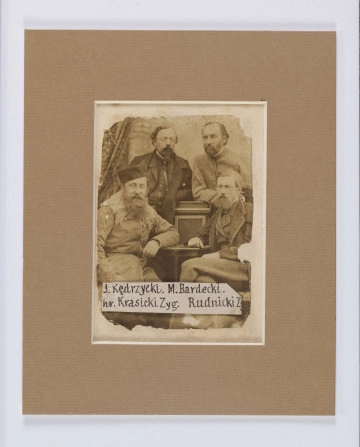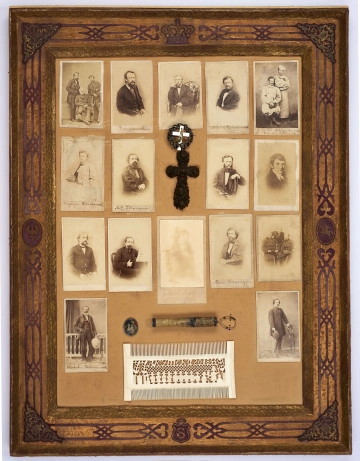
Janusz Kossakowski and Wincenty Herbst
1863
National Museum in Lublin
Part of the collection: Memorabilia related to the November and January Uprisings in the Lublin Region
Posters and cegiełka [donation] for veterans were printed to help former insurgents materially. It was a sign of society's concern for those who fought for Poland's freedom in 1863. Cegiełka dates from the First World War, when care began to be taken not only for their due honour, but also for their livelihood.
The 1863 Uprising ended in defeat. Many people lost their lives for taking part in it, the insurgents were sentenced to Siberian exile and their property confiscated. When they survived exile and returned to their homeland, they had nothing to live on. They were too old and sick to work. They lived in poor conditions, without care. Some had to beg. At the same time, the partitioning authorities, especially the Russian, suppressed the commemorations of the uprisings and the memory of the insurgents. In Galicia, where restrictions were lightest, lectures commemorating the uprising were organised, during which collections for veterans were made.
The first veterans' organisations were formed in Kraków, Lviv and Poznań. In Lublin, such an organisation was formally established only in 1915, when the Russian army withdrew from the city and the Austrians introduced greater freedom. This made it possible to celebrate the anniversary of the uprising that same year, during which Daniel Śliwicki, editor of the "Ziemia Lubelska" newspaper, proposed setting up an association to help veterans and their families in difficulty. Money was raised in various ways, e.g. the exhibition entitled "1863 Souvenirs" was prepared, and many pieces of cegiełka were issued.
Józef Piłsudski demanded that the veterans be remembered and honoured. He issued an order to count former soldiers among the Polish Army, with the right to wear their uniforms on public holidays. In 1919, the Sejm granted military pensions to veterans, and they were also promoted. Young soldiers took care of the insurgents' graves. The memory of heroes was very important for the identity of the nation, which was regaining freedom after one hundred and twenty-three years of partitions.
Author / creator
Dimensions
cały obiekt: height: 5 cm, width: 7,5 cm
Object type
printing
Technique
Material
paper
Creation time / dating
Creation / finding place
Owner
The National Museum in Lublin
Identification number
Location / status

unknown
1863
National Museum in Lublin

unknown
1863
National Museum in Lublin

unknown
1844 — 1865
National Museum in Lublin
DISCOVER this TOPIC
Castle Museum in Łańcut
DISCOVER this PATH
Educational path
0/500

We use cookies to make it easier for you to use our website and for statistical purposes. You can manage cookies by changing the settings of your web browser. More information in the Privacy Policy.
We use cookies to make it easier for you to use our website and for statistical purposes. You can manage cookies by changing the settings of your web browser. More information in the Privacy Policy.
Manage cookies:
This type of cookies is necessary for the website to function. You can change your browser settings to block them, but then the website will not work properly.
WYMAGANE
They are used to measure user engagement and generate statistics about the website to better understand how it is used. If you block this type of cookies, we will not be able to collect information about the use of the website and we will not be able to monitor its performance.